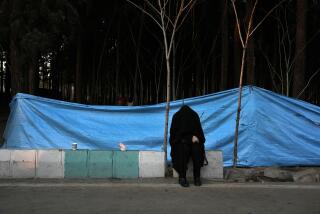Group linked to Al Qaeda says it’s behind recent suicide blasts in Iraq
- Share via
BAGHDAD — An Al Qaeda-affiliated group claimed responsibility Tuesday for the devastating suicide bombings last week at two government ministries in Baghdad, and Iraq and Syria recalled their ambassadors in an escalating dispute over whether Damascus may have aided in attacks.
The claim of responsibility came in a statement posted on the Internet by the Islamic State of Iraq, the name now used by the Sunni Muslim Al Qaeda in Iraq organization. The group acknowledges few bombings, and those tend to be among the most spectacular.
However, Iraq’s government appears to be convinced that Syrian-based members of Saddam Hussein’s dismantled Baath Party were primarily responsible for the devastating explosions Aug. 19 at the foreign and finance ministries, which killed 95 people and wounded more than 500 in the heart of Baghdad.
At a meeting Tuesday, the Iraqi Cabinet demanded that Syria hand over two Baathist leaders believed to be living there and summoned the Iraqi envoy back from Damascus, the Syrian capital.
“A decision was made to direct a demand to the country where the attack was launched,” Prime Minister Nouri Maliki told reporters, directly implicating Syria, during a visit with Baghdad’s governor.
Maliki also called for the establishment of an international war crimes tribunal to try the suspects. He said he believed that Al Qaeda also played a role in the attacks, but his remarks mainly focused on the allegations that Baathists and Syria were involved.
Iraqi state television on Sunday broadcast a videotaped confession by a man claiming to be a Baathist, who said he had helped carry out the bombing at the Finance Ministry. He said he had acted on the orders of a Damascus-based Iraqi called Sattam Farhan, who was working for the Baathist group led by Mohammed Yunes Ahmed.
Iraq’s Cabinet demanded that Syria hand over Farhan and Ahmed, as well as others who may have been linked to the attacks in Iraq, said a statement by government spokesman Ali Dabbagh.
Syria promptly recalled its envoy from Baghdad, marking a sharp deterioration in relations between two neighbors who have long had frosty ties because of suspicion that Syria harbored senior leaders of Hussein’s regime and facilitated the flow of foreign fighters across its border to join Al Qaeda.
Damascus denied the allegations, saying they were based on “fabricated evidences intended to serve internal political goals,” Syria’s state news agency reported.
U.S. officials say they are still troubled that Syria may have helped foreign fighters cross the porous border but are more inclined to suspect that Al Qaeda was involved in the bombings, which military spokesmen have said bore all the “hallmarks” of the international terrorist network.
Al Qaeda has been suspected of being linked to several other recent attacks on Shiite Muslims and ethnic minorities. But last week’s bombings were an assault against the institutions of the state.
In its statement posted on the Internet, the Islamic State of Iraq said it had carried out the bombings to expose the government’s weaknesses.
--
Times staff writers Usama Redha and Saif Hameed contributed to this report.
More to Read
Sign up for Essential California
The most important California stories and recommendations in your inbox every morning.
You may occasionally receive promotional content from the Los Angeles Times.










